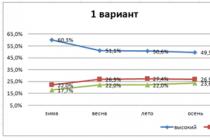Lecture Search
The duration of overtime work should not exceed for each employee 4 hours for two consecutive days and 120 hours per year.
Labor Code of the Russian Federation, Article 93. Part-time work
By agreement between the employee and the employer, part-time work (shift) or part-time work week can be established both at the time of employment and subsequently. The employer is obliged to establish a part-time working day (shift) or part-time working week at the request of a pregnant woman, one of the parents (guardian, curator) who has a child under the age of fourteen (a disabled child under the age of eighteen), as well as a person caring for a sick family member in accordance with a medical certificate issued in accordance with the procedure established by federal laws and other regulatory legal acts of the Russian Federation.
When working on a part-time basis, the employee is paid in proportion to the time worked by him or depending on the amount of work performed by him.
Work on a part-time basis does not entail any restrictions for employees on the duration of the annual basic paid leave, the calculation of seniority and other labor rights.
Labor Code of the Russian Federation, Article 96. Work at night
Night time is from 22:00 to 06:00.
The duration of work (shift) at night is reduced by one hour without subsequent working off.
The duration of work (shift) at night is not reduced for employees who have a reduced working time, as well as for employees hired specifically for work at night, unless otherwise provided by the collective agreement.
The duration of work at night is equalized with the duration of work in the daytime in cases where it is necessary for working conditions, as well as in shift work with a six-day working week with one day off. The list of the specified works can be determined by the collective agreement, the local normative act.
Guarantees and benefits provided to women in connection with motherhood apply to fathers raising children without a mother, as well as to guardians (custodians) of minors (see Article 264 of the Labor Code of the Russian Federation).
The following are not allowed to work at night: pregnant women; employees under the age of eighteen, with the exception of persons involved in the creation and (or) performance of works of art, and other categories of employees in accordance with this Code and other federal laws. Women with children under the age of three, disabled people, employees with disabled children, as well as employees caring for sick members of their families in accordance with a medical certificate issued in accordance with the procedure established by federal laws and other regulatory legal acts of the Russian Federation, mothers and fathers raising children under the age of five without a spouse (wife), as well as guardians of children of this age may be involved in night work only with their written consent and subject to , unless such work is prohibited by them for health reasons in accordance with a medical report. At the same time, these employees must be informed in writing of their right to refuse to work at night.
Labor Code of the Russian Federation, Article 101. Irregular working hours
Irregular working hours - a special mode of work, in accordance with which individual employees may, by order of the employer, if necessary, be occasionally involved in the performance of their labor functions outside the working hours established for them. The list of positions of employees with irregular working hours is established by a collective agreement, agreements or local regulations adopted taking into account the opinion of the representative body of employees.
Labor Code of the Russian Federation, Article 106. The concept of rest time
Rest time - the time during which the employee is free from the performance of labor duties and which he can use at his own discretion.
Labor Code of the Russian Federation, Article 107. Types of rest time
The types of rest periods are:
Ø breaks during the working day (shifts);
Ø daily (inter-shift) rest;
Ø weekends (weekly uninterrupted rest);
Ø non-working holidays;
vacation Ø.
Labor Code of the Russian Federation, Article 114. Annual paid holidays
Employees are granted annual leave while maintaining their place of work (position) and average earnings.
Labor Code of the Russian Federation, Article 115. Duration of the annual basic paid leave
Annual basic paid leave is granted to employees for a duration of 28 calendar days.
Annual basic paid leave lasting more than 28 calendar days (extended main leave) is granted to employees in accordance with this Code and other federal laws.
Labor Code of the Russian Federation, Article 122. Procedure for granting annual paid holidays
Paid leave must be granted to the employee annually.
The right to use the leave for the first year of work arises for the employee after six months of his continuous work with this employer. By agreement of the parties, an employee may be granted paid leave before the expiration of six months.
Before the expiration of six months of continuous work, paid leave at the request of the employee must be granted:
women - before maternity leave or immediately after it;
employees under the age of eighteen;
employees who have adopted a child (children) under the age of three months;
in other cases stipulated by federal laws.
Leave for the second and subsequent years of work may be granted at any time of the working year in accordance with the order of granting annual paid leaves established by the employer.
Pay and regulation of labor.
Labor Code of the Russian Federation, Article 129.
Basic concepts and definitions
Salary (employee's wages) - remuneration for work depending on the qualifications of the employee, the complexity, quantity, quality and conditions of the work performed, as well as compensation payments (additional payments and allowances of a compensatory nature, including for work in conditions that deviate from normal, work in special climatic conditions and in territories exposed to radioactive contamination, and other compensation payments) and incentive payments (additional payments and allowances of a stimulating nature, bonuses and other incentive payments).
The tariff rate is a fixed amount of remuneration of an employee for fulfilling a labor norm of a certain complexity (qualification) per unit of time without taking into account compensatory, incentive and social payments.
Salary (official salary) - a fixed amount of remuneration of an employee for the performance of labor (official) duties of a certain complexity for a calendar month, excluding compensatory, incentive and social payments.
Basic salary (basic official salary), basic wage rate - the minimum salary (official salary), the wage rate of an employee of a state or municipal institution engaged in professional activities in the profession of a worker or an employee in the relevant professional qualification group, excluding compensatory, incentive and social payments.
Labor Code of the Russian Federation, Article 131.
What is the maximum overtime for an employee?
Forms of remuneration
Wages are paid in cash in the currency of the Russian Federation (in rubles).
In accordance with a collective agreement or an employment contract, upon a written application of an employee, remuneration may also be made in other forms that do not contradict the legislation of the Russian Federation and international treaties of the Russian Federation. The share of wages paid in non-monetary form may not exceed 20 percent of the accrued monthly wage.
Payment of wages in bonds, coupons, in the form of promissory notes, receipts, as well as in the form of alcoholic beverages, narcotic, poisonous, harmful and other toxic substances, weapons, ammunition and other items in respect of which prohibitions or restrictions on their free circulation are established, is not allowed.
©2015-2018 poisk-ru.ru
All rights belong to their authors. This site does not claim authorship, but provides free use.
Copyright Violation and Personal Data Violation
Overtime work and its limitations
Overtime is considered to be work performed by an employee in excess of the length of working time established for him, provided for by the internal labor regulations. At the same time, work is recognized as overtime only in those cases when it is performed at the suggestion, order or with the knowledge of the employer.
The Labor Code provides for three different grounds for applying overtime: the employee's consent; the prescription of the law; condition of the collective agreement, agreement.
By virtue of the prescription of the law, overtime work is allowed only in the following cases: in the performance of work to prevent a public disaster, industrial accident; in the production of socially necessary works on water supply, gas supply, heating, lighting, transport.
Overtime work is not allowed: pregnant women; workers under 18; workers studying on the job in general educational institutions; exempted from overtime work in accordance with the medical report.
Overtime work must not exceed 4 hours for each employee for two consecutive days and 120 hours per year. This number does not include work performed by virtue of the prescription of the law. The main compensation for working overtime is additional pay.
Rules for calculating overtime hours in case of summarized accounting of working hours
By agreement with the employer, the employee may also be granted another day of rest.
Women with children aged 3 to 14 years, as well as disabled people, can be involved in overtime work with their consent, while disabled people - only when such work is not prohibited in accordance with a medical report.
66. Time relax – the time established by law, during which the employee is free from the performance of his labor duties and has the right to use it at his own discretion. There are two ways to regulate the length of rest time: indirect and direct. The indirect method consists in the legislative limitation of the duration of working hours, the direct one in the legislative fixing of specific types of rest time. Types of rest time: 1 Break during the working day (break for rest and meals - at least 20 minutes, no more than 4 hours). 2 Interday (everyday) breaks are breaks in work between the end of one working day and the beginning of the next. There must be at least twice the duration of work. 3 Weekly rest days are days off. (can be used to compensate for shortfalls up to a weekly rate) Compensation for working on a day off can be provided in the form of another day of rest or monetary compensation not lower than the 2nd compensation. 4 Public holidays. They are planned in advance in the work schedule and are included in the monthly norm of working time.
Return to list
From time to time, the employer and employees face the question: how to properly pay for hours worked overtime (the so-called overtime).
First of all, decide on the time - to clarify the number of hours worked in excess of the norm.
How many hours should overtime work be?
Time accounting can be summarized: in this case, overtime processing is paid for hours in excess of the norm for the accounting period. In this case, according to the generally accepted practice, only two hours will be paid at the rate of one and a half; with this approach, if the accounting period is not over, and the employee continues to work, “processing” automatically begins. Two and only two - in each accounting period in which there was processing.
IMPORTANT! Remember, summarized accounting is introduced just when, according to the conditions of the activity, it is impossible to observe the normal working hours (Art.
104 of the Labor Code of the Russian Federation). However, summarized accounting does not cancel shift schedules. And here the question arises: should hours worked overtime be considered overtime on this particular day? In the opinion of a number of employees, despite the fact that summary accounting has been introduced, the established shift schedule also normalizes the employee's working hours, and it is precisely the daily norm. And thus, it is the “daytime” processing that should be used. But this is not true! Article 99 of the Labor Code of the Russian Federation directly indicates that, with a summarized accounting of time, processing is work in excess of the normal number of hours for the accounting period.
IMPORTANT! Based on the foregoing regarding the correct accounting for processing: you should not try to cheat and, for the purpose of lower pay, calculate the daily processing (if any) for any day in order to determine how many hours to pay in one and a half times, and how many in double. This is a violation of labor laws.
If no totalized time tracking is set, overtime will be considered any duration in excess of the normal duration of the shift. Accounting should be kept accurately (Article 99 of the Labor Code of the Russian Federation) - but again, it is not disclosed how accurately. Strictly speaking, it will not be a mistake to take into account the minutes of processing (i.e., an employee who has worked 45 minutes will have not a rounded hour in the timesheet as processing, but only the exact 0.75 hours).
After you have decided on the number of hours, it is time to calculate the "hourly" cost. If you have an hourly rate, then you use it as a basis: one and a half rates for the first two hours, two rates for the next (Article 152 of the Labor Code of the Russian Federation).
But! Article 152 of the Labor Code of the Russian Federation does not disclose what exactly is meant by the term "one and a half size" and how exactly it is defined. Average daily earnings divided by the number of daily hours worked? A specific daily rate (daily part of the salary) divided by the number of hours worked on a given day?
There is a generally accepted approach, given in Article 153 of the Labor Code of the Russian Federation, which clarifies wages on weekends and non-working holidays for all forms of wages. But how correct would it be to apply such a form for overtime?
There is a letter from the Ministry of Health of the Russian Federation No. 16-4 / 2059436 of 07/02/2014, which indicates that you can use the rules of Article 153 of the Labor Code of the Russian Federation - using a tariff or rate without taking into account compensatory and incentive payments. True, we should not forget that it means that the “northern”, “regional” and “harmful” surcharges are already taken into account in the tariff or rate. Otherwise, they must be credited for “processing”.
IMPORTANT! This letter is not a normative act.
Further in the letter, the Ministry of Health indicates that in order to calculate the hourly tariff rate, it is most reasonable to divide the salary by the average monthly number of hours (the annual norm of working hours divided by 12). In this case, in different months, the employee will receive the same payment for processing, which, in principle, is reasonable. As for various allowances and additional payments for "overtime" - we consider the position of the Ministry of Health ("include in one and a half and double payment all allowances and additional payments established in the organization or part of them") is not entirely correct. Surcharges and allowances should be applied to the payment of all working time, and not part of it. Otherwise, there is a deterioration in the position of the employee in terms of ensuring payment for the same work performed during “normal” hours and “overtime”.
We also recall that to determine the average daily wage, the methodology given in Article 139 of the Labor Code of the Russian Federation (average wage) is used. Which, strictly speaking, according to the letter of the law, is not applicable to the calculation of "overtime", but can be used to determine the average daily earnings, and, accordingly, the calculation of payment in proportion to the hours worked overtime (i.e. dividing the average earnings by the normal length of the working day). However, there is a nuance here - the average daily earnings include previously made processing, payments and compensation, and not a “net” salary (rate, tariff).
Due to the fact that the procedure for determining the hourly rate (rate of payment) is not established by law, you can set it yourself and “legitimize” it by adopting an appropriate internal document.
Remember only that you should not worsen the situation of workers in comparison with the norms already in force.
Region on the islands
Article 99. Overtime work
(As amended by Federal Law No. 90-FZ dated June 30, 2006)
(see text in previous
Overtime work is work performed by an employee at the initiative of the employer outside the working hours established for the employee: daily work (shift), and in the case of summarized accounting of working time - in excess of the normal number of working hours for the accounting period.
Involving an employee in overtime work by an employer is allowed with his written consent in the following cases:
1) if necessary, perform (finish) the work that has been started, which, due to an unforeseen delay due to the technical conditions of production, could not be performed (completed) within the working hours established for the employee, if the failure to perform (non-completion) of this work may lead to damage or destruction of the property of the employer (including the property of third parties held by the employer, if the employer is responsible for the safety of this property), state or municipal property, or create a threat to life and health of people;
2) in the performance of temporary work on the repair and restoration of mechanisms or structures in cases where their failure may cause the termination of work for a significant number of employees;
3) to continue work in the absence of a replacement employee, if the work does not allow a break.
Recycling rate per year according to the Labor Code of the Russian Federation
In these cases, the employer is obliged to immediately take measures to replace the shift with another employee.
Engaging an employer of an employee to work overtime without his consent is allowed in the following cases:
1) in the performance of work necessary to prevent a catastrophe, industrial accident or eliminate the consequences of a catastrophe, industrial accident or natural disaster;
2) when performing socially necessary work to eliminate unforeseen circumstances that disrupt the normal functioning of centralized hot water supply, cold water supply and (or) water disposal systems, gas supply, heat supply, lighting, transport, communications systems;
(as amended by Federal Law No. 417-FZ dated 07.12.2011)
(see text in previous)
3) in the performance of work, the need for which is due to the introduction of a state of emergency or martial law, as well as urgent work in emergency circumstances, that is, in the event of a disaster or threat of disaster (fires, floods, famine, earthquakes, epidemics or epizootics) and in other cases that endanger the life or normal living conditions of the entire population or part of it.
In other cases, involvement in overtime work is allowed with the written consent of the employee and taking into account the opinion of the elected body of the primary trade union organization.
It is not allowed to involve pregnant women, employees under the age of eighteen, other categories of employees in overtime work in accordance with this Code and other federal laws. Involvement in overtime work of disabled people, women with children under the age of three, is allowed only with their written consent and provided that this is not prohibited by them for health reasons in accordance with a medical certificate issued in accordance with the procedure established by federal laws and other regulatory legal acts of the Russian Federation. At the same time, disabled people, women with children under the age of three, must be familiarized with their right to refuse overtime work against signature.
The duration of overtime work should not exceed for each employee 4 hours for two consecutive days and 120 hours per year.
It is the employer's responsibility to ensure that each employee's overtime hours are accurately recorded.
Art. 99 of the Labor Code of the Russian Federation. Overtime work
In some cases, the employer cannot do without involving his employees in work beyond the length of the working day. Involving an employee in overtime work is allowed only if such an employee does not belong to the category of citizens who cannot be involved in such work.
Working hours norm. Exceeding the norm
40 hours a week is the norm established by labor legislation (part 2 of article 91 of the Labor Code of the Russian Federation). This length of working time is considered normal for all employees, regardless of what type of activity the company is engaged in, its legal form, type of employment contracts and other conditions.
Overtime in the sense of the Labor Code of the Russian Federation is work that is performed at the request of the company's management in excess of the established norm. That is, more hours than are set in the working day or shift. And if the employee has a summarized accounting of working hours, then in excess of the norm of working hours established for a certain accounting period.
Which employees are not allowed to work overtime?
Employees are not allowed to work overtime:
- without their consent (when their consent is required);
- having the right to refuse to work above the norm (in emergency circumstances, when the employer has the right to engage in overtime work without consent);
- falling into the category of workers who cannot be involved in work after the end of the working day under any circumstances.
When is it not allowed to engage in overtime work without the consent of the employee?
It is possible to involve in work in excess of the established norm only with the consent of employees under the following circumstances:
- to complete work that was not completed due to an unforeseen delay;
Such a delay must be due to the technical conditions of production.
In addition, if the consequences of non-completion of work may be damage or destruction of municipal, state or company property (other persons in the organization when the management is responsible for the safety of this property) or a threat to the health or life of people
- for the restoration or repair of mechanisms (structures);
If the failure of these mechanisms can cause a cessation of work for a large number of employees
- to continue the work of a shift who did not show up for work.
The conditions for engaging in overtime work in this situation: the work does not allow a break and requires the employer to take immediate measures to replace the shift with another employee
In other cases, in addition to consent, the opinion of the elected body of the primary trade union organization must also be taken into account.
That is, if there is no consent of the employee, it is impossible to involve him in overtime work. There are exceptions to this rule.
When it is possible to involve persons in overtime work without their consent
Engagement by the employer of an employee to work overtime is allowed without the consent of:
- in order to prevent a catastrophe or accident or to eliminate their consequences and the consequences of a natural disaster;
- for public works to eliminate unforeseen circumstances that disrupt the normal operation of centralized systems of cold water supply and (or) sewerage, hot water supply, gas supply systems, transport, heat supply, communications, lighting;
- in a state of emergency or martial law, as well as for urgent work in such circumstances in the event of a threat of disaster or directly in the event of a disaster (floods, fires, famine, earthquakes, epizootics or epidemics) and in other circumstances that endanger normal living conditions or the life of the population.
Only the following may refuse such work:
- workers who are parents of children with disabilities;
- disabled people;
- a parent raising one (without a spouse) a child not older than five years;
- women with children under three years of age;
- workers caring for sick family members (if there is a medical certificate);
- guardians (custodians) of minors.
Who can not be involved in work beyond the norm
- pregnant women;
- workers under 18 years of age (except for some creative workers and athletes);
- employees during the term of the apprenticeship contract;
- other employees when it is not allowed by law (for example, for medical contraindications).
As can be seen, disability in itself is not a legal basis for the impossibility of involving an employee in overtime work. The main conditions are that such an employee agrees to such work and that there are no medical contraindications. Therefore, it is possible to involve disabled people in overtime work subject to these conditions.
Updated 02/27/2020
2018-09-09T16:13:04+03:00
What is the procedure for applying for overtime work? Stages of actions of the employer, samples of accompanying documentation. Who can and who can not be involved in overtime work.
(click to open)
Overtime work - work performed by an employee at the initiative of the employer outside the working hours established for the employee: daily work (shift), and in the case of summarized accounting of working hours - in excess of the normal number of working hours for the accounting period (Article 99 of the Labor Code of the Russian Federation).
Procedure for engaging in overtime work
There are two main stages of attracting an employee to work overtime.
First stage:
It is important for the employer to remember that he is obliged to notify certain categories of employees about the right to refuse such work by signature. All verbal agreements with employees can lead to disputes. To avoid this, it is necessary to adhere to the position that all employee-employer agreements are documented. Therefore, the employer must:
- obtain the written consent of the employee;
- make sure there are no medical contraindications;
- notify employees under a personal signature of the right to refuse to perform overtime work.
The notification of the employee does not have a special form, but contains information:
- Name;
- notification number and date of issue;
- Full name and position of the involved specialist;
- the reasons for which it became necessary to attend overtime;
- the date when you need to work "extra" hours (you can specify the time interval);
- conditions - increased wages or compensation in the form of additional rest due to the employee.
The notice is signed by the head of the employing company. The employee can express his will by putting his signature in the "Agree" or "Disagree" field.
A sample written consent to engage in overtime work can be viewed
Second phase:
The employer issues an order to engage in overtime work and must familiarize the employee with it. The unified form of such an order is not approved, so the employer draws it up in free form. The order must specify:
- the reason for involving the employee in overtime work;
- start date of work;
- surname, name, patronymic of the employee;
- his position and details of the document in which the employee expressed his consent to be involved in such work.
A sample order for overtime work can be viewed.
If the collective agreement or local regulatory act establishes the amount of the surcharge, then it is possible to indicate this amount in the order. The amount may also be determined by agreement of the parties. With the order of the employee must be familiarized under the signature.
When engaging employees in overtime work, it is worth remembering that the duration of such work should not exceed four hours for each employee for two consecutive days and 120 hours per year. To do this, the employer is obliged to ensure that the duration of overtime work of each employee is accurately recorded.
In the time sheet, overtime work is marked with the letter "C" or the numbers "04", and next to it is indicated the number of hours worked in excess of the norm. If a standard daily record of hours worked is maintained for employees, it is recommended that standard and overtime hours be reflected separately in two lines on overtime days. And if summarized accounting of working hours is used, overtime is reflected at the end of the accounting period.
What is overtime work
- to prevent a catastrophe, industrial accident, eliminate their consequences;
- to eliminate the circumstances due to which the centralized systems of water, heat and gas supply, transport and communications do not function;
- in the event of a state of emergency or martial law and in other emergency cases that threaten the population (fires, floods, etc.).
The consent of the trade union organization is not required to engage in work on the indicated grounds, since these circumstances are extraordinary.
In case of refusal to perform such work, an appropriate act is drawn up, and the employee is subject to disciplinary liability.
With the written consent of an employee, an employee can be involved in overtime work in the following cases (part 2 of article 99 of the Labor Code of the Russian Federation):
- if necessary, perform (finish) the work that has been started, which, due to an unforeseen delay due to the technical conditions of production, could not be performed (completed) within the working hours established for the employee, if failure to perform this work may lead to damage or destruction of the employer's property or create a threat to the life and health of people;
- during temporary work on the repair and restoration of mechanisms or structures in cases where their malfunction can cause a stoppage of work for many employees;
- to continue work if the replacement employee does not appear, if the work does not allow a break.
In other cases, involvement in overtime work is allowed only with the written consent of the employee and taking into account the opinion of the elected body of the primary trade union organization (part 4 of article 99 of the Labor Code of the Russian Federation, ruling of the Supreme Court of the Russian Federation of November 14, 2006 in case No. 4-B06-31).
Who is not allowed to work overtime
Overtime work is not allowed:
- pregnant women;
- employees under the age of 18 (with the exception of underage athletes, as well as creative workers of the media, cinematography organizations, television and video crews, theaters, theater and concert organizations, circuses and other persons involved in the creation or performance of works (Articles 348.8 and 268 of the Labor Code of the Russian Federation);
- persons with whom a student agreement has been concluded (Article 203 of the Labor Code of the Russian Federation);
- other categories of employees in accordance with the Labor Code of the Russian Federation and other federal laws.
Women with children under the age of three may be allowed to work overtime with their written consent and provided that overtime work is not prohibited to them for health reasons in accordance with a medical certificate issued in accordance with the procedure established by federal laws and other regulatory legal acts. A similar procedure is established for the disabled. Both those and others must be familiarized against receipt with their right to refuse overtime work.
Overtime pay

The procedure for paying for overtime hours of work is regulated by article 152 of the Labor Code of the Russian Federation. In contrast to the previously existing rules for paying hours worked in excess of the norm. It provides for the possibility for the employer to approve specific amounts of payment for overtime work in an employment or collective agreement, but not lower than those stipulated in Art. 152 of the Labor Code of the Russian Federation, which defines the minimum threshold for payment for excess hours of work.
Overtime work is paid at a higher rate. For the first two hours of work in one and a half times, for the next hours - in 2 times. This is the minimum threshold provided for by the Labor Code, below which you cannot pay, but above it you can. You can fix this kind of provision in a collective agreement, regulation on wages and other regulations for the enterprise.
In addition to increased pay for overtime hours, as an alternative, provision may be made for the provision of additional hours of rest in the amount of at least those worked in excess of the norm. The written consent of the employee must be obtained for such a replacement, and the time of use of such compensation must be agreed upon by both parties. At the same time, the Labor Code does not define the maximum length of rest time provided as compensation for overtime worked. More specifically, this can be spelled out in a collective or labor agreement or other local acts of the organization. Specialists in the field of labor law recommend that the type of compensation for overtime worked be prescribed directly in the written consent of the employee for overtime work. If these are additional hours of rest, then it is also recommended to prescribe their number here.
Overtime pay for total billing
To understand this issue, one should adhere to paragraph 5.5 of the Recommendations on the use of flexible working hours at enterprises, institutions and organizations of the sectors of the national economy, approved by the Decree of the USSR State Labor Committee No. 162, All-Union Central Council of Trade Unions No. 12-55 of 05/30/1985. These Recommendations are valid to the extent that they do not contradict the Labor Code of the Russian Federation (
Article 99. Overtime work
- checked today
- code dated 01.01.2020
- entered into force on 01.02.2002
There are no new versions of the article that have not entered into force.
Compare with the wording of the article dated 06.10.2006 01.02.2002
Overtime work is work performed by an employee at the initiative of the employer outside the working hours established for the employee: daily work (shift), and in the case of summarized accounting of working time - in excess of the normal number of working hours for the accounting period.
Involving an employee in overtime work by an employer is allowed with his written consent in the following cases:
- 1) if necessary, perform (finish) the work begun, which, due to an unforeseen delay due to the technical conditions of production, could not be performed (completed) within the working hours established for the employee, if the failure to perform (non-completion) of this work may lead to damage or destruction of the property of the employer (including the property of third parties held by the employer, if the employer is responsible for the safety of this property), state or municipal property, or create a threat to life and health of people;
- 2) in the performance of temporary work on the repair and restoration of mechanisms or structures in cases where their failure may cause the termination of work for a significant number of employees;
- 3) to continue work in the absence of a replacement employee, if the work does not allow a break. In these cases, the employer is obliged to immediately take measures to replace the shift with another employee.
Engaging an employer of an employee to work overtime without his consent is allowed in the following cases:
- 1) in the performance of work necessary to prevent a catastrophe, industrial accident or eliminate the consequences of a catastrophe, industrial accident or natural disaster;
- 2) when performing socially necessary work to eliminate unforeseen circumstances that disrupt the normal functioning of centralized hot water supply, cold water supply and (or) water disposal systems, gas supply, heat supply, lighting, transport, communications systems;
- 3) in the performance of work, the need for which is due to the introduction of a state of emergency or martial law, as well as urgent work in emergency circumstances, that is, in the event of a disaster or threat of disaster (fires, floods, famine, earthquakes, epidemics or epizootics) and in other cases that endanger the life or normal living conditions of the entire population or part of it.
In other cases, involvement in overtime work is allowed with the written consent of the employee and taking into account the opinion of the elected body of the primary trade union organization.
It is not allowed to involve pregnant women, employees under the age of eighteen, other categories of employees in overtime work in accordance with this Code and other federal laws. Involvement in overtime work of disabled people, women with children under the age of three, is allowed only with their written consent and provided that this is not prohibited by them for health reasons in accordance with a medical certificate issued in the manner established by federal laws and other regulatory legal acts of the Russian Federation. At the same time, disabled people, women with children under the age of three, must be familiarized with their right to refuse overtime work against signature.
The duration of overtime work should not exceed for each employee 4 hours for two consecutive days and 120 hours per year.
The employer is obliged to ensure that the overtime hours of each employee are accurately recorded.
Other articles of the section
Art. 99 Labor Code of the Russian Federation
References to Art. 99 of the Labor Code of the Russian Federation in legal advice
- Overtime work
17.02.2018 Good morning Natalia. How long is your shift? For example in Article 99 of the Labor Code of the Russian Federation It is said: Engaging an employer of an employee to work overtime without his consent is allowed in the following cases: 1) in the performance of work necessary
- Employment contract
02.11.2017 At the same time, transfer to work requiring lower qualifications is allowed only with the written consent of the employee. As for overtime, it's the same, norms Article 99 of the Labor Code of the Russian Federation
- Irregular hours and overtime work
09.03.2017 The grounds for working overtime are unequivocally an order (written) by the employer, and in some cases, the written consent of the employee himself is also required. Art. 99 Labor Code of the Russian Federation), also in Art. 99 Labor Code of the Russian Federation the circle of persons who cannot be involved in overtime work is indicated. For example, if a pregnant woman works part-time
- overtime work
06.03.2016 worked the required number of hours, and worked 2 days does not mean that overtime was applied, you worked within the schedule, according to the norm Article 99 of the Labor Code of the Russian Federation in this position are not violated. If you have 8-hour shifts in your employment contract, as well as in the Internal Labor Regulations, then
- Can overtime be forced to work 12 hours instead of the scheduled 6 hours
30.12.2015 legal, since the use of overtime work is usually permissible in case of emergency, for example, an accident or an urgent order. IN Article 99 of the Labor Code of the Russian Federation
- Article 92 of the Labor Code of the Russian Federation
14.10.2015 set 40 hours for this category of workers, then 4 hours will already be considered overtime work, the use of which is allowed in compliance with the norms given in Article 99 of the Labor Code of the Russian Federation and with the consent of the employee and no more than 120 hours per year. There will be more questions, please contact.
- overtime
13.10.2015 instead of increased pay, it can be compensated by the provision of additional rest time, but not less than the time worked overtime Another point Article 99 of the Labor Code of the Russian Federation stated: The duration of overtime work should not exceed for each employee 4 hours for two consecutive days and 120 hours per year. Employer
- The employer registered the employee on the basis of an order only
29.09.2015 failure to conclude an employment contract in writing; - Article 22 of the Labor Code of the Russian Federation does not familiarize with the local acts of the enterprise; - Article 91 of the Labor Code of the Russian Federation lack of fixation of working hours; - Article 99 of the Labor Code of the Russian Federation attraction to overtime work, without your consent and payment on the basis of Article 152 of the Labor Code of the Russian Federation. In addition, wages and compensation
-
24.06.2015 being on the exam is not included in the teaching load, then this should be considered overtime work, which is possible only with the written consent of the employee. IN Art. 99 Labor Code of the Russian Federation there are also a number of exceptions when the consent of the employee is not required, but your case does not apply to exceptions. Also for overtime work
- payment for hours not provided for by the teaching load
24.06.2015 TK RF. With regards to opting out. THEN, if this is not spelled out in the official duties and the exams take place over the established 36 hours, then you need to use Article 99 of the Labor Code of the Russian Federation, which says that overtime work can be involved only with the consent of the employee. One more thing, what is specified in the employment contract? How many workers
- Additional pay up to 40 hour work week
10.06.2015 Good morning Anastasia. In your case, those 4 hours are pure overtime, which should be paid accordingly. IN Article 99 of the Labor Code of the Russian Federation Overtime work is work performed by an employee at the initiative of the employer outside the working hours established for the employee.
- Working hours, transport costs
08.05.2015 accordingly, after the end of the shift, you cannot be detained to perform additional work. With regard to the performance of overtime work, in this regard, in Article 99 of the Labor Code of the Russian Federation Overtime work is work performed by an employee at the initiative of the employer outside the working hours established for the employee.
Article 99 of the Labor Code of the Russian Federation
11.02.2015 About overtime hours according to Article 99 of the Labor Code of the Russian Federation everything is clear there are no questions here, but the main question is about COMBINATION. That employees are offered a combination with a 30% supplement to their salary, but the employer is trying
- Combination
06.02.2015 Good afternoon, Dmitry. As regards overtime hours, Article 99 of the Labor Code of the Russian Federation stated: The duration of overtime work should not exceed for each employee 4 hours for two consecutive days and 120 hours per year. That is, over
03.10.2016 two hours and double the amount for the following, but the hours of rest must correspond to the hours worked. that is at least 6 hours. However, considering that based on Article 99 of the Labor Code of the Russian Federation you can be involved in overtime work for no more than 4 hours for two shifts in a row, you could not be involved in overtime work for 6 hours during
13.04.2016 Good morning Michael. In your case, this is involvement in overtime work, and without your consent, as stated in Article 99 of the Labor Code of the Russian Federation: Overtime work - work performed by an employee at the initiative of the employer outside the working hours established for the employee
02.12.2015 overtime work. At the same time, the duration of overtime work should not exceed 4 hours for each employee for two consecutive days and 120 hours per year. IN Article 99 of the Labor Code of the Russian Federation Overtime work is work performed by an employee at the initiative of the employer outside the working hours established for the employee.
The legislator defines work in excess of the normal working hours outside the accounting period established for this employee as overtime or as work on irregular working hours.
Overtime work- this is the performance by the employee of his labor function outside the normal one at the initiative of the employer or with his knowledge.
Overtime involves both exceeding the norm and violating it. At the same time, according to the Labor Code of the Russian Federation, in some cases the consent of the employee is not required (part 3 of article 99), in others, work is performed only with the written consent of the employee (part 2 of article 99) and is carried out taking into account the opinion of the elected body of the primary trade union organization (part 4 of article 99).
Overtime work is associated with increased energy costs and a reduction in rest time, therefore, labor legislation establishes a number of guarantees for those who perform it. According to the Labor Code of the Russian Federation, these include, in particular: limitation of overtime work (four hours for two consecutive days and 120 hours a year - part 6 of article 99); increased pay (for the first two hours at least one and a half times, for the next hours - at least twice - Art. 152); a special procedure that determines the procedure for engaging in overtime work; the prohibition to involve in overtime work workers in need of increased social protection, for example, pregnant women and workers under the age of 18 years (part 5 of article 99); a special procedure for involving employees of certain categories in overtime work. Thus, the performance of overtime work by disabled people, women with children under the age of three years, is allowed only with their written consent and provided that this is not prohibited to them for health reasons in accordance with a medical report. These workers must be familiarized against signature with their disposition to refuse overtime work (part 5 of article 99 of the Labor Code of the Russian Federation).
These guarantees also apply to employees with disabled children under the age of 18; workers caring for sick members of their family in accordance with a medical certificate issued in accordance with the procedure established by labor legislation; mothers and fathers raising children of the appropriate age without a spouse (part 3 of article 259 of the Labor Code of the Russian Federation), and for guardians (custodians) of minors (art. 264 of the Labor Code of the Russian Federation).
The head of the organization issues an order (instruction) to involve employees in overtime work. The order indicates the basis for engaging in overtime work, for example, the need to eliminate the consequences of an industrial accident, the prevention of an accident at work (Article 99 of the Labor Code of the Russian Federation). This order indicates the surname, name, patronymic of the employees involved in its implementation, as well as the duration of such work.
Judicial practice proceeds from the fact that compliance with the procedure established by law for attracting employees to overtime work is mandatory. So, if, in violation of the requirements of the law, the order (instruction) to involve in overtime work was not issued by the head of the organization, and the employees worked after the end of the shift on the basis of an oral instruction from the head of the unit, for example, the head of the shop, then payment for their work should be made in an increased amount as overtime.
Part 2 Art. 99 of the Labor Code of the Russian Federation contains a list of overtime work, the performance of which requires the written consent of the employee. Such cases include the need to complete the work that has been started if its failure to do so may lead to serious consequences, the performance of temporary work on the repair and restoration of mechanisms or structures, the failure of which may cause a significant number of employees to stop working, as well as the continuation of work if the replacement employee does not appear, if the work does not allow a break.
The list of circumstances that allow the employer to involve employees in overtime work without their written consent is given in Part 3 of Art. 99 of the Labor Code of the Russian Federation. This refers to emergency circumstances that endanger life, normal living conditions of the population or part of it, the performance of work necessary to prevent disasters, industrial accidents, eliminate the consequences of catastrophes, accidents and natural disasters, the implementation of socially necessary work to eliminate violations of life support systems.
Part 4 Art. 99 of the Labor Code of the Russian Federation provides for the possibility of involving employees in overtime work in other cases, in addition to the emergency and unforeseen circumstances listed in the article. The concept of "other cases" is not defined in the law, which allows the employer to apply overtime work in case of any complications in the activities of the organization, individual entrepreneur. As an additional guarantee of limiting overtime work in the absence of emergency or unforeseen circumstances, provided for in Parts 2 and 3 of Art. 99 of the Labor Code of the Russian Federation, the employer must comply with the requirements of Art. 372 of the Labor Code of the Russian Federation - to request the opinion of the elected body of the primary trade union organization. The requirement to take into account the opinion of the elected body of the primary trade union organization may be considered fulfilled if the employer has notified this body in advance of the need to apply overtime, the grounds for which such a need arose, and the volume (duration) of overtime work. When making a final decision, the employer must have the opinion of the trade union body.
A peculiar kind of overtime work, not mentioned in the Labor Code of the Russian Federation, but often used in practice, are shifts. The term “duty” is used in three senses:
- performance by the employee of his usual labor duties within the framework of the profession, qualification during shift work;
- fulfillment by him of labor duties that are not included in the scope of his usual labor duties;
- the employee is in a state of readiness to perform labor duties at the request of the employer.
Duty in its various forms is used, for example, in housing and communal services, energy organizations, education, and government agencies. Significantly different meaning, which is embedded in the concept of "duty" by industry and local regulations, does not allow to unambiguously determine its legal essence. This often allows the employer to deprive the employee of the guarantees established for him by labor legislation.














